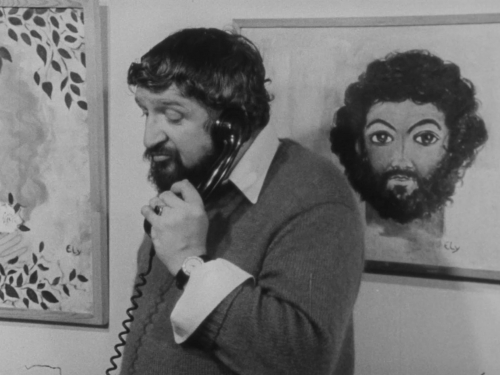
“Boredom is the dream bird that hatches the egg of experience.”
Walter Benjamin1
With the imperturbability of a great humorist, he stubbornly adheres to a fixed camera position. Buchet dared to tell a non-story with indecisive protagonists. In an atmosphere of ironic passivity, twelve tableaux or “stations” punctuate the stages of Suzanne’s flight from Albert to Emile and back to Albert. The Albert in question plods along between his friends Emile and Victor, while Albert’s presence as an abandoned wreck is difficult to bear for Victor’s girlfriend. Grumpy but amiable, these three “young old men” repeat fragements of sentences, yawning and totally bored. Albert and Victor have an outspoken love-hate relationship with the books that surround them. And in the midst of a proustian flow of words (Suzanne as Albertine...), Victor unexpectedly disturbs the thick layer of indifference with an emotional outburst. The director considered him worthy of a major exception, in blatant contradiction to his general poetics: boring and austere white in which the characters move or cannot move forward as if in a coagulated water plane, but in a very human way, despite the rather bizarre light in which Buchet shows them. Those are the mysteries of La fugue de Suzanne: a description of the crisis of the intellectual, but also an exercise in non-violent, spiritual and lofty recitation. Leaving from the port of Beckett, via the intermediate port of Tardieu and passing Eustache, Buchet runs aground on a beach that is clearly his, populated by grey shadows and palpitating unspoken but no less vivid feelings. The gestures and words have the somewhat sleepwalking economy of Eastern pantomimes, but Suzanne and her “old men” between two ages are closely related to our daily conflicts, to our inner torments. Buchet aims high, but fortunately feigns irony and provocation; his extreme distanciation is not the only merit of this quite extraordinary film.
Francesco Savio2
« Jean-Marie Buchet, c’est Bresson ou Duras revu par le Douanier Rousseau, c’est notre Eustache à nous, sans les références culturelles et le parisianisme. »
“Jean-Marie Buchet kan men gerust in het rijtje plaatsen van een Bresson of een Duras, maar dan bekeken door de bril van een Henri Rousseau. Men kan hem verder typeren als ónze Jean Eustache, ontdaan van zijn specifiek Parijse context.”
“Jean-Marie Buchet is Bresson or Duras as seen by Henri Rousseau. He is our very own Eustache, stripped from his Parisian context.”
Boris Lehman3
- 1Walter Benjamin, The Storyteller, Verso Books, 2016 [1936].
- 2Franco Cordelli and Emidio Greco, red., Il Mondo di Francesco Savio, Falsopiano, April 2002 [1974].
- 3Boris Lehman in Juy Jungblut, Patrick Leboutte and Dominique Païni, red., Encyclopédie des cinémas de Belgique, Crisnée: Yellow Now, 1990.

